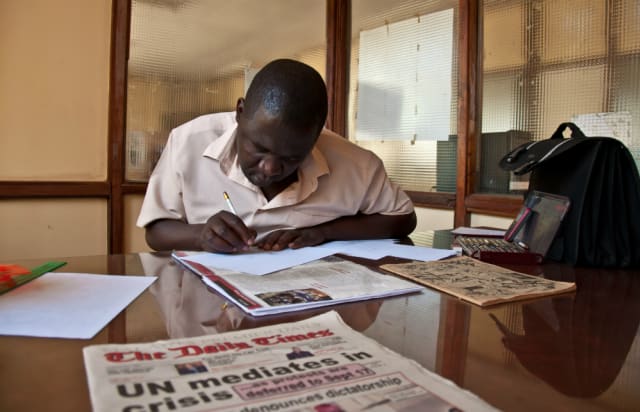What's Missing in Malawian Political Cartoons

Political cartoonist Hazwel Kunyenje draws, on average, 15 cartoons per week. Depending on the level of detail, creating a cartoon might take him from 15 minutes to four hours. Photo: Elena Sosa Lerín
Hazwel Kunyenje is a political cartoonist who has spent more than 15 years illustrating articles, editorials and short stories for one of Malawi's largest media houses, Blantyre Newspapers Limited.
Of affable allure and with a serene expression, Kunyenje remembers drawing on any piece of paper or surface he could find as a child.
"Drawing was a necessity," he says, "I just felt I had to do it and I knew I wasn't bad at it."
Although he studied painting at the University of Malawi, he is mostly a self-taught caricaturist who has "picked [up] some tricks along the way."
He follows cartoonists at Newsweek and The Washington Post and enjoys Dik Browne's Hägar the Horrible because of its unclassifiable humour.
Political cartooning is relatively new in this country. Before the 1990s, the press was just an outlet for government propaganda, and cartoons were mere depictions of places or events, often published in lieu of photographs.
But between 1993 and 1994, the 33-year rule of President Hastings Banda came to an end, and the press was liberated. Suddenly, there was a demand to graphically satirize the new political atmosphere, and editors hired anyone who could caricature it.
Kunyenje started working as a cartoonist at New Voice, a small, local newspaper in the northern city of Mzuzu — but he had broader aspirations.
In 1994, he mailed samples of his work to the editors of BNL, a move that has placed him on the national press scene for the past 17 years.
Political cartoonists in other countries (like Burkina Faso's Damien Glez, Kenya-based Godfrey Mwampwemba, or Canada's André Pijet) are usually accepted serious commentators and analysts of political and social issues due to their satirical but critical look at local and world issues.
But unlike them, Kunyenje feels that cartoonists in Malawi are merely considered "people that can draw well."
He believes that editors and readers overlook the impact of cartoons on democratization.
As a matter of fact, Kunyenje has limited control over the creation of his cartoons, as they regularly follow the vision of his editors. Most of the time, they are the ones who decide on the subject of a cartoon and even the jokes.
"Editors in Malawi don't have a good idea of what a cartoon can do," he explains.
At this point, Kunyenje's stutter takes over his speech. He stops talking, reaches for his briefcase and pulls out a folder. He starts flicking through dozens of carefully catalogued cartoon clippings from different national and international newspapers and magazines he has collected throughout the years and soon finds what he wants.
"This. This is what we don't have in Malawi." Kunyenje holds a small, aged clipping dated Feb. 16, 1989. It shows a fat vulture wearing a headscarf, about to prey on an emaciated bear lying on the ground. It is the editorial take by world-renowned Israeli cartoonist Ranan Lurie on the end of the Soviet occupation in Afghanistan.
"We aren't this sophisticated," emphasizes Kunyenje. He thinks Malawian cartoons lack the degree of visual metaphor and symbolism that other cartoonists bring to their work, in part due to editorial decisions, but also because cartoonists are still forging their identity in the newsroom.
Something that would contribute to the betterment of cartoonists in Malawi is criticism. But Kunyenje points out that he only gets positive feedback from the readers, who he says, "think cartoons are just something to laugh at."
Yet there is always the occasional government official who threatens the papers with censorship, like the Minister of Information and Tourism, Patricia Kaliati, who in April 2006, considered cartoons from national newspapers The Daily Times and The Nation to be "disgracefully castigating the government."
Although his editors deal directly with the censorship threats, he welcomes such comment on his cartoons — even if they're negative — because such comments are an acknowledgement of the art of cartooning.
► A version of this story was originally published on October 2016 in The Toronto Star's 'Africa without Maps' blog.
Follow me on Twitter: @e_sarin. Email me your thoughts, suggestions, or critiques at: elenasosalerin@gmail.com.